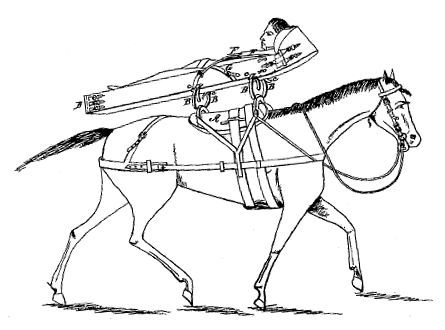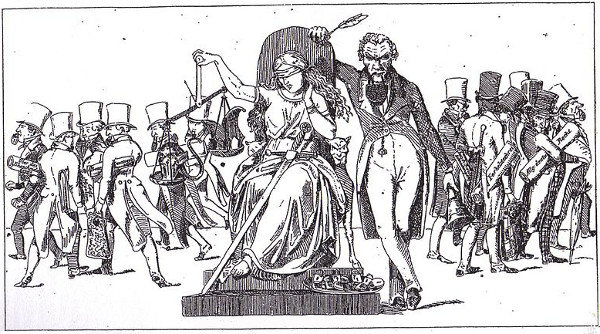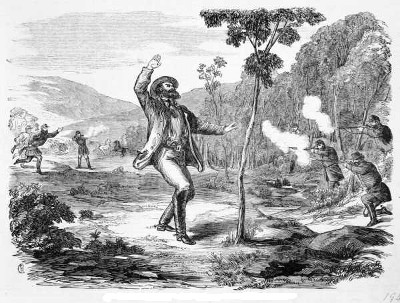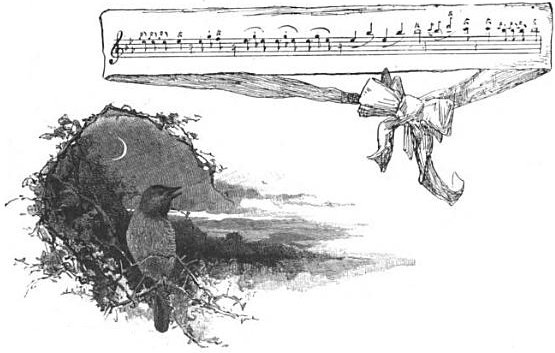
Japanese novelist Tarō Hirai wrote detective fiction under the pseudonym Edogawa Rampo.
That’s a phonetic rendering of one of the genre’s inventors — Edgar Allan Poe.

Japanese novelist Tarō Hirai wrote detective fiction under the pseudonym Edogawa Rampo.
That’s a phonetic rendering of one of the genre’s inventors — Edgar Allan Poe.

A puzzle by Lewis Carroll:
A bag contains one counter, known to be either white or black. A white counter is put in, the bag shaken, and a counter drawn out, which proves to be white. What is now the chance of drawing a white counter?

This is U.S. patent number 112, “saddle for removing the sick and for other purposes,” issued in 1837 to the magnificently named Hezekiah Thistle of New Orleans.
The patient (or body) lies on a bed mounted on springs above the wooden saddle. “There is also a strap G attached to the side of the bed near the center which passes around the thigh and is buckled to the outside of the bed in an oblique direction to prevent the wounded man from slipping down.”
Even the horse looks grim.

“Lawyers are the only persons in whom ignorance of the law is not punished.” — Jeremy Bentham
Letter to the Times, March 23, 1973:
Sir,
I would be most grateful if I could pass on the following to you and your readers before the bloom goes from it.
I have just stepped out of a cab in which I travelled through London with a starry-eyed taxi driver. I had hardly got into the cab when he looked at me and said: ‘D’you mind guvnor if I tell you something? I have just been at the airport at Heathrow and there, suddenly, this Frenchman comes up to me carrying a magnificent bunch of flowers in his hand. Gosh, you should have seen it guvnor, and he hands it to me and says, “Taxi, if I pay you double fare, will you take these flowers and give them to your Queen?” And I looks at him as if he was mad and he says to me: “Now look taxi, I am serious; are you on or are you not?” And what do you think I did?’
‘What did you do?’ I asked him.
‘Cor, I couldn’t let ‘im and ‘er down, so I just come from the bleeding Palace.’
Yours truly,
Laurens van der Post

Suspect A has shot a man through the heart during the last half minute. But Suspect B shot him through the heart during the preceding 1/4 minute, Suspect C shot him through the heart during the 1/8 minute before that, and so on. Assuming that a bullet through the heart kills a man instantly, the victim must already have been dead before any given suspect shot him.
Indeed, notes José Benardete, he cannot be said to have died of a bullet wound.
A correspondent of the Manchester Sporting Chronicle, thinking that his horse was short-sighted, had his eyes examined by an oculist, who certified that the horse had a No. 7 eye and required concave glasses. These were obtained and fitted on to the horse’s head. At first the horse was a little surprised, but rapidly showed signs of the keenest pleasure, and he now stands all the morning looking over the half-door of his stable with his spectacles on, gazing around him with an air of sedate enjoyment. When driven his manner is altogether changed from his former timidity; but if pastured without his spectacles on, he hangs about the gate whinnying in a plaintive minor key. If the spectacles are replaced he kicks up his heels and scampers up and down the pasture with delight.

A puzzle by Henry Dudeney:
A lady is accustomed to buy from her greengrocer large bundles of asparagus, each twelve inches in circumference. The other day the man had no large bundles in stock, but handed her instead two small ones, each six inches in circumference. “That is the same thing,” she said, “and, of course, the price will be the same.” But the man insisted that the two bundles together contained more than the large one, and charged a few pence extra. Which was correct — the lady or the greengrocer?
Help me be MANIC so I may be joyous though the results are equivocal.
Help me be DEPRESSIVE for when a prediction is verified, I must know that it will not later be confirmed.
Help me be SADISTIC so I suffer not though the subjects be sorely anguished.
Help me be MASOCHISTIC for even the most obstinate experimental animal should be a pleasure to me.
Help me be PSYCHOPATHIC to quiet the guilt when I tell loved ones that the experiment is going well.
Help me be SCHIZOPHRENIC to sustain myself by finding hopeful trends in random data.
Help me be PARANOID so I can see in the hostile attitudes of others the supremacy of my own work.
Help me to have ANXIETY ATTACKS so that even on holidays I find myself toiling in the laboratory.
And finally,
Help my wife get a job! for when I cross over the shadowy border of normalcy, somebody will have to support the kids. Amen.
— R.A McCleary in the Worm Runner’s Digest, November 1960

In an 1891 feature, the Strand attempted to notate the songs of various English birds. The nightingale, shown here, “shares with the lark the honours of poesy. Though sometimes dwelling for minutes on a strain composed of only two or three melancholy tones, beginning with a mezza voce, it swells gradually, by a most perfect crescendo, to the highest point of strength, and ends with a dying cadence.”
The songs of birds have long inspired human composers. In 1934 the Rev. K.H. MacDermott, an associate of the Royal College of Music, wrote to the Times:
For many years each spring I have tested the cuckoo’s notes with a piano, and have found that they are always within a tone of D and B, or D and B flat (treble stave). It is of interest to observe that Beethoven, a great lover of birds, when he introduced the imitation of the cuckoo at the end of the second movement of his Pastoral Symphony, gave the two notes D and B flat, to be played by the clarionet. As Beethoven was at the time he composed that work (1808) completely deaf one wonders whether it was by chance he selected the correct notes, or merely because they fit in with the key of the movement, or whether his memory of the bird’s song had survived after he had been unable to hear it for some years. If the latter, it is fascinating to realize that the cuckoo has not altered the pitch of his notes for over a century.
Beethoven used this technique more than once. Ornithologist and bioacoustics expert Luis Baptista of the California Academy of Sciences compared the call of the white-breasted wood wren to the famous opening bars of the composer’s Fifth Symphony:

And if humans imitate birds, Baptista also found that “when birds compose songs they often use the same rhythmic variations, pitch relationships, permutations, and combinations of notes as human composers,” noted Patricia Gray, head of the National Academy of Sciences’ Biomusic program, in Science in 2001. “Thus, some bird songs resemble musical compositions; for example, the canyon wren’s trill cascades down the musical scale like the opening of Chopin’s ‘Revolutionary’ Etude.”
Indeed, birdsong reflects every elementary rhythmic effect found in human music, Gray wrote. “There are interval inversions, simple harmonic relations, and retention of melody with change of key.” Many birds transpose motifs into different keys, and some pitch their songs to the same scale as Western music.
Modern composers have narrowed the gap still further. Olivier Messiaen’s 1952 flute piece Le merle noir was based entirely on the song of the blackbird, and his orchestral work Réveil des oiseaux is built almost entirely on the songs one hears at daybreak in the Jura mountains of the composer’s native France. Critic Paul Griffiths said he considered Messiaen a more conscientious ornithologist than any previous composer, and a more musical observer of birdsong than any previous ornithologist.
This must end somewhere, though. If we’ve been emulating birds’ music, now they’re emulating our technology.